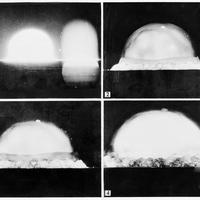
Oct 4, 2017
In this broadcast version of our Nukes episode, we tell the story of Tsutomu Yamaguchi who, in early August of 1945, had a run of the worst luck imaginable. A double blast of radiation left his future, and the future of his descendants, in doubt.
On the morning of August 6th, 1945, Tsutomu Yamaguchi was in Hiroshima on a work trip. He was walking to the office when the first atomic bomb was dropped about a mile away. He survived, and eventually managed to get himself onto a train back to his hometown ... Nagasaki. The very next morning, as he tried to convince his boss that a single bomb could destroy a whole city, the second bomb dropped. Sam Kean, whose latest book The Violinist's Thumb scrutinizes the mysteries of our genetic code, tells Jad and Robert the incredible story of what happened to Tsutomu, explains how gamma rays shred DNA, and helps us understand how Tsutomu sidestepped a thousand year curse.
Then, we sit on the other side of the table and look at the protocol behind the country the dropped the bombs:
President Richard Nixon once boasted that at any moment he could pick up a telephone and - in 20 minutes - kill 60 million people. Such is the power of the US President over the nation’s nuclear arsenal. But what if you were the military officer on the receiving end of that phone call? Could you refuse the order?
In this segment, we profile one Air Force Major who asked that question back in the 1970s and learn how the very act of asking it was so dangerous it derailed his career. We also pick up the question ourselves and pose it to veterans both high and low on the nuclear chain of command. Their responses reveal once and for all whether there are any legal checks and balances between us and a phone call for Armageddon.